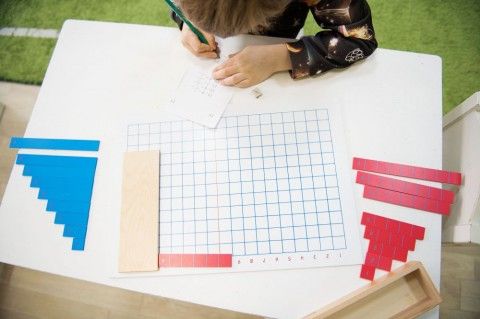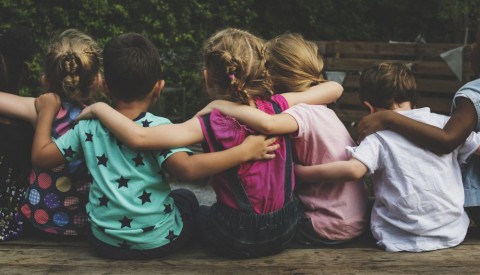The Capstone Year in Early Childhood

The Montessori early childhood classroom serves children from the age of 3 to 6 years. Ideally, children spend three years in this classroom. In Montessori, the 3rd year is often referred to as the Capstone Year. This year is equivalent to the traditional Kindergarten year. FMSL strongly recommends that a 3rd year student follows a 5 day schedule so that they can capitalize on all of the learning opportunities open to them in this important year and so they can have enough time to practise and process the year’s curriculum. The final year in early childhood is the harvest year for all the planting and intellectual tending that has gone on for the preceding years in preschool.
The Capstone Harvest
The 3rd year child’s learning explodes into an avalanche of reading and writing and math. All of the earlier preparation (practical life, sensorial) now finds academic outlets. The 3rd year child not only gains a wider breadth of knowledge but a deeper understanding of what they have learned and now is able to use this knowledge to enhance their own intellectual pursuits.
A Montessori education is not just cumulative in its learning; it is exponential in its understanding. The learning that happens in this final year of early childhood is not just adding another year’s knowledge but multiplying what is learned and applying it to what is to come. It is common for Montessori 3rd year graduates to be able to read well (and write) and to understand math far beyond addition and subtraction all the way to multiplication, division and geometry. Maybe even more significantly, the lifetime patterns of responsibility, goal setting, having a work ethic, working through mistakes, inquiry and curiosity are being firmly set.
The 3rd year in a Montessori classroom is also the year of mentoring. It is the year when the five year old is able to really help their classmates. This mentoring year is significant for two reasons. First, when you teach others, you really master the subject for yourself. Second, when you are asked to teach you demonstrate your mastery of the material. It is this mastery that produces the profound feelings of self-confidence and assurance that is the hallmark of Montessori students. Real achievement and real achievement demonstrated builds real self-esteem.

To miss this formative year that sets successful life patterns is to miss the ultimate advantage of this unique preschool experience.
Leaving the Montessori program before the capstone year often places a child into an educational setting that is not as advanced; nor one that allows for the initiative that has been carefully cultivated during the earlier preschool years. The child is often introduced to a different curriculum one that lacks the individual intellectual satisfaction that comes from exploring and discovering the wonderful world of learning found in Montessori.The essence of successful life is to be able to make wise choices. The Montessori 3rd year student is at a major threshold of exercising that wise decision making power. To lose that opportunity is to lose a significant part of the hard won success of the preceding years.
“Education is not the filling of a pail, but the lighting of a fire.”- W.B. Yeats
The great gift of an education is not the accumulation of facts and statistics but the lighting of the fire of learning, discovery and joy. It is a gift that Montessori children have the privilege and pleasure of opening and using for a lifetime.
Adapted from The Kindergarten Year in Montessori by Edward Fidellow, www.crossmountainmedia.com